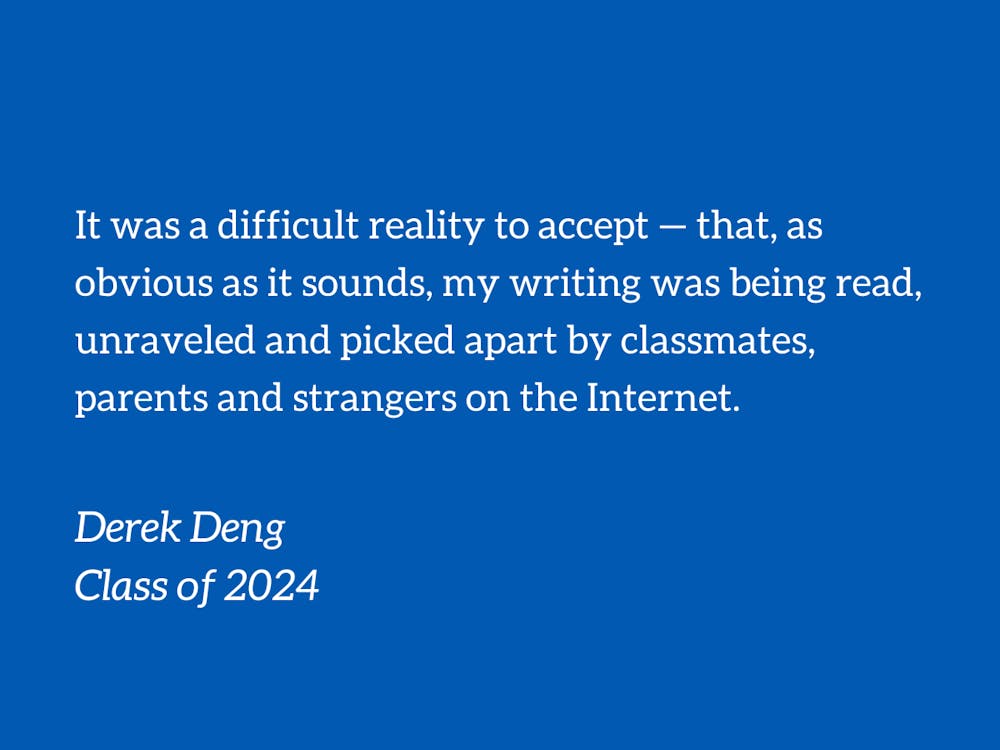“Derek, your secret is out,” my sister texted me. “Mom and Dad read your Chronicle article. They know you’re gay.”
Freshman year, I penned a staff note for The Chronicle in which I mulled over the shortcomings of navigating Tinder as a gay Asian-American man. Anyone and everyone who knew me — and knew of me — was well aware of this facet of my identity: I was unabashedly flamboyant, sported neon baby tees to my discussion sections and rotated through straight girlfriends like $5 Shein halter tops. Everyone, of course, except my parents, who were blissfully oblivious to my raging homosexuality. They woke up one day with an insatiable curiosity to read my work for The Chronicle, so they Googled me, stumbled upon my staff note and came to know a little bit more about me. And just like that, I was outed by The Chronicle.
Or did I out myself? While I was writing my staff note, I knew there was a minuscule chance that my parents would read it. But for most of my life, I never took writing that seriously. I strung together words with a fresh-faced innocence, operating on the assumption that I was writing into the void. No one has the time to read this fluff anyway, I thought to myself. So I laid my emotions bare in The Chronicle.
I soon learned that I was not writing into the void.
It was a difficult reality to accept — that, as obvious as it sounds, my writing was being read, unraveled and picked apart by classmates, parents and strangers on the Internet. From then on, I began to develop an acute consciousness of this reality, weaving together words with deliberate sobriety. I was scared to write. To write meant to be perceived, which meant to be judged, which meant to be criticized. Inevitably, these concerns bled into my personal life. Existing at Duke was a mental exercise. I developed a keen sensitivity to how I appeared to others, constantly questioning the space that I took up in the white, heteronormative confines of Duke. Caught up in these misgivings, I opened up a Common App transfer application.
I never got around to those transfer applications; I couldn’t bear to rehash the humbling ordeal of college admissions. Somehow, in some way, I learned to let go of my existential anxieties via TikTok. In the ephemeral expanse of bite-sized videos, I found a peculiar freedom in the algorithmic carousel of dance trends and get-ready-with-me vlogs. People were shooting the shit on TikTok, sending their most unserious efforts into the digital abyss.
So I started shooting the shit. I fabricated a love story between me and my roommate. I bought a jersey that said “Bimbo” on it and ended up going viral on Mexican soccer TikTok. Simultaneously, I accumulated a few haters, someone tried to perform brujeria on me and my Duke peers came to know me as the “baby tee twink.”
And to the haters, I say: And what about it? My fondness for digital dilly-dallying reconciled my relationship with posting — and writing — into the void. That was when I began to rekindle my fresh-faced enthusiasm for storytelling, be that cultural analysis articles about Addison Rae or how-to articles on TikTok beauty trends.
When I reflect on my most iconic moments at Duke, they all tie back to my readiness to shoot the shit. Take, for instance, that time I took an influencer class at Duke and wrote a Cosmopolitan article about it. Or when I entered a contest to win a free trip to the Bahamas, so I made a video about bidets and won a free trip to the Bahamas. Oh, and my face is literally plastered on a double-decker bus in Miami because I decided I wanted to try out modeling.
A few weeks ago, I came across screamintothevoid.com. Its premise is simple: type whatever you may desire, press the “scream” button and watch your words dissolve into the void. Once you’re done screaming, a message pops up: “Glad nobody read that!”
I’ve visited that website around 27 times in the past week. I have plenty of things to scream about, questions that remain unanswered. But I’ve learned to embrace the absurdity of it all — to let go and scream into the void.
The moral of the story, then, is that there is no moral of the story. These few years are the years wherein we can afford to spend a few hours people-watching on BC Plaza instead of prepping for a McKinsey case interview. Because when else can you board a school bus to a field in the middle of nowhere in a skimpy sailor costume just to listen to frat boys attempt to DJ? Duke, as I’ve come to know it, is really damn fun when you surrender to the void and emancipate yourself from other people's expectations.
Case in point: I started writing this article with no idea of what I was going to write about. Just a Google Doc, a kiwi guava Celsius and a dream. And I think I’m doing alright.
Derek Deng is a Trinity senior who served as Recess editor for the Chronicle’s 119th volume.
He would like to thank his co-editors Anna and Jules for putting up with his dilly-dallying. He extends his warmest congratulations to Zev, who will try his best to live up to Derek’s unparalleled legacy as he leads Vol. 120 Recess. He is confident that Recess will thrive and prosper thanks to its immensely talented team of writers and editors. He thanks his many fans for supporting his endeavors and shaping him into the icon that he is today.
Get The Chronicle straight to your inbox
Sign up for our weekly newsletter. Cancel at any time.
Derek Deng is a Trinity senior and a recess editor of The Chronicle's 119th volume.

